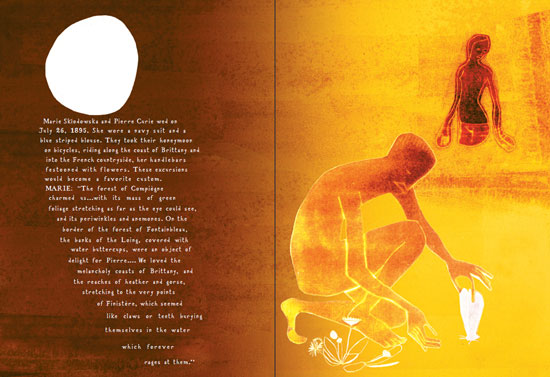Campus partners with publisher to make “Radioactive” accessible
Scientific discovery, sacrifice and the love story of two groundbreaking scientists unfold in the beautifully complex pages of this year’s selection for Go Big Read, the University of Wisconsin–Madison’s common-reading program.
But the one-of-a-kind typeface and vibrant illustrations in “Radioactive: Marie and Pierre Curie, A Tale of Love and Fallout” presented a challenge: Find a way for readers with disabilities to experience the book’s subject matter and content, as well as the way the images contribute to its emotional impact.
“We knew that a traditional audiobook featuring a single narrator reading the text would not do the job,” says Sarah McDaniel, program manager for Go Big Read.
Taking to heart Go Big Read’s mission to inspire a shared campus conversation that includes all voices, UW Libraries and McBurney Disability Resource Center collaborated with HarperCollins Publishers to create audio and portable document format (PDF) versions of the book by Pulitzer Prize-nominated illustrator Lauren Redniss.
“We were both excited about and daunted by the challenge of developing the accessible text,” McDaniel says. “But we were committed to providing a high level of access to all our readers.”
The team from the UW and HarperCollins looked for examples of accessible versions of other types of visual texts, such as graphic novels and museum catalogs, but found few examples that achieved the level of accessibility they wanted for people with visual or physical impairments or learning disabilities.
“The book is innovative, and it requires an innovative solution,” says Todd Schwanke, an adaptive technology specialist with McBurney.
The collaboration yielded the two accessible versions of the book that present the narrative text, along with image descriptions, in formats customized to the needs of readers with disabilities. The MP3 format is recorded audio playable on most computers and portable digital devices and the PDF gives readers the option to view and zoom in on content and hear the text and descriptions read by a computer.
Listen to a sample audio image description from page 34
Listen to a sample of the text from page 34
Listen to a sample audio image description from page 35
Unlike most audio books, the MP3 version of “Radioactive” is segmented in shorter tracks, allowing readers to jump to specific pages and differentiate the image descriptions from the text.
Kelly Warren, of Madison-based Mindseye Audio, produced the audio version of the book. This was the first time she had worked on a book; much of her audio-description work is for children’s and educational videos.
In addition to recording the text, Warren wrote descriptions of the book’s images, which total more than 100 among the 208 pages. She consulted with her colleague Gregg Willard, an artist who performed the male voices for the audio recording, to craft descriptions of the artwork.
“It was really challenging, because we wanted to bring in some of our interpretation of what the art was like without being too subjective,” Warren says. “That’s the big thing with audio description. The rule is, ‘Don’t tell the listener how to think. Don’t tell them what to think.’ You’re to remain very objective.”
Warren also brought in other voices. She enlisted Tomasz Borowiecki, a fluent Polish speaker, to record the names of Polish luminaries listed on pages 66 and 67in the book. For pages recounting the memories of a 13-year-old girl living in Hiroshima at the time of the atomic bomb, Kyoko Rohde, a native of Japan who lives in Madison, read the text for the recording.
The PDF, which opens in two-page spreads to match the layout of a book, includes text and images that can be read using text-to-speech software on a computer. The format allows readers to go back and highlight certain passages or re-read individual words.
HarperCollins covered the costs of developing both accessible versions of the book, working very actively with the UW, Warren and another firm to produce them.
“We wanted to be certain that all students would be able to tap into the richness of the images and the text,” says Diane Burrowes, the publisher’s senior director for academic marketing.
The PDF and MP3 versions are available for people participating in Go Big Read programming with documented disabilities that impact their ability to use traditional print books in a standard way, including UW students working through McBurney, university faculty and staff, and community members participating in book discussions and public programs. For more information, contact the Go Big Read Program.
Tags: audio, Go Big Read, libraries, student resources


 Sample audio image description
Sample audio image description

